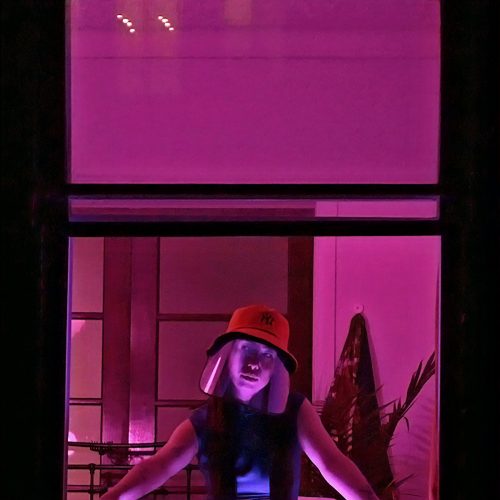There’s something ironic about being lonely in a city. A city, after all, is defined by the fact that there’s a lot of people, and they usually serve as a cultural hub for the surrounding area. And yet so many people who live in cities find themselves feeling lonely or alienated, confined to offices, subways, and apartments. The global pandemic has only exacerbated this issue; now, people who may not have been social butterflies ache for human connection.
Hua Li, a self-described “half-Chinese, half-militant half-rapper” who lives in Montreal, perfectly captures that sense of yearning on her latest song, “Four More Days”. Over a warm, melancholic beat that’s reminiscent of Nujabes (or a “lo-fi beats to chill to” stream, depending on your frame of reference), Hua Li sings to her distant significant other, reflecting on her feelings and longing to get back together. It’s jazzy and sweet, but there’s a heavy heart to the song, too; it’s wonderful music for a rainy day.
“Four More Days” is billed as “a quarantine love song”, and Hua Li nails the strange liminal state of self-isolation. Even if your routine hasn’t changed dramatically, there’s a different energy to it; you feel like you’re stuck in an existential waiting room. And so, like Hua Li, we keep ourselves busy and think about what comes next. She daydreams about “four more days in the mountains”, and she notes, wryly, that her lover is probably thinking the same thoughts as she is. “Think I’ve got you in a tailspin, too,” she sings, and she seems to take some degree of comfort in that. If you can’t be together, then mutual pining might be the next best thing.
You describe yourself as a “half-Chinese, half-militant half-rapper”. Would you mind breaking down just what you mean by that?
This is meant to be tongue-in-check, you know, because it implies that I am made up of three halves! I am a Hapa woman, born to a Chinese mother and a white Canadian father. People think I’m a rapper but I actually mostly sing. The half-militancy refers to the ambivalence I feel toward revolution at times. I am deeply pained by the harm that Western society enacts on the majority of its people, but I do not romanticize revolution because I am acutely aware of the way societal upheaval directly impacted my own family and me, as well, through inter-generational trauma that I actively try to heal everyday. That said, I am also always in awe of the revolutionary fighters in my family, especially my grandmother who sacrificed so much in her time in the People’s Liberation Army.
“Four More Days” evokes the loneliness of quarantine, but it also evokes the everyday loneliness of modern city life. Do you think we took human contact for granted before the pandemic?
For me personally, I think I took my relationships for granted, but I also took the benefits of solitude for granted. I keep thinking about how before all this, if I wanted connection, I could just hop on my bike and head to any number of bars and venues where I would be sure to run into people I love. Now I am taking more time to reach out and show people I care about them and asking for connection – things I was unconsciously uncomfortable doing before.
The beat is marvelous, warm and cozy yet undeniably melancholic. When you first heard it, did you know what kind of song you were going to make for it?
Actually, Alex and I don’t work in this traditional producer-rapper way where he crafts a beat and I wrote the top-line. Many of my songs start on the piano, and this one is no exception. I recorded a demo with the vocals live piano and synth elements that I shared with Alex and he developed the beat from there. I would say more often than not, this is how we work, a happy back-and-forth.
As a half-Chinese woman living in a francophonic part of Canada, how have the various cultures around you influenced your music?
One time someone said to me, “All of the anglophones that move to Montreal are unconsciously denouncing the rest of Canada, because they want to be in the place that considers itself removed from the rest of the country.” That idea really resonates with me. I’ve lived in Quebec for 13 years and my French is finally getting to be coherent, though not at all eloquent. That said, I think moving to Montreal was the best thing I could have done for my music – the music community I find myself in is inspiring and transgressive and coming here from Victoria opened my eyes to a type of diversity I never experienced growing up.
Do you have any plans after quarantine?
Do you know when “after quarantine” will be?!? Tough to make too many concrete plans for now but I do for sure know that my Yellow Crane EP, from which “Four More Days” is the lead single, will be coming out on October 16th. I’ve been incredibly prolific in these past few months, so things are looking good for an emotionally rich sophomore album in 2021.
What are your hopes for the future?
I hope that Canada is able to end modern segregation and apartheid and a formal process can be made to end centuries-long occupation on indigenous land. Personally, I hope to continue to grow and discover new ways to love and be loved. I hope to always make music until the day I die.







